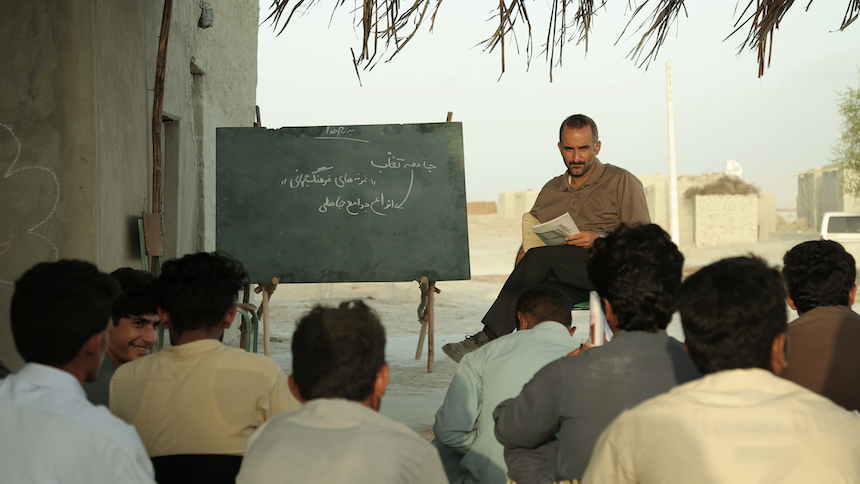Rotterdam 2023 Review: ENDLESS BORDERS Aims For Humanism
Directed by Abbas Amini, the drama from Iran blends social melodrama and refugee thriller in an audience-driven narrative depicting a flight for freedom.

Independent Iranian cinema keeps delivering new films in quantities and qualities that would validate the use of a wave.
Endless Borders by Abbas Amini is among the recent batch, a co-production between Iran, Germany, and the Czech Republic. Amini joins the ranks of his peers with morally-tinged, present-day dramas, albeit he does it with a sense of genre storytelling.
Teacher Ahmad (Pourya Rahimi Sam) is the front and center of Amini's social drama. Stuck between Iran, Afghanistan, and Pakistan - Balochistan, Ahmad teaches local kids in small tribal-like community. He is not there because of a choice but as a punishment for a transgression committed in Tehran.
Ahmad tried to assimilate into the local culture and not draw the attention of authorities. But he still remains an outsider and one who is at risk of further repercussions. He is carrying out his sentence in limbo, not belonging anywhere, while waiting for his wife Niloof to be released from prison for the very same transgression he committed. Amini patiently observes Ahmad, the fish out of water, as he gets sucked into the affairs of others, only because he following his conscience.
The border where Ahmad lives is a transition place for Afghani people fleeing Taliban oppression. Some spend several days waiting for a clandestine free vehicle to take them to Turkey. Ahmad walks around a group of refugees who ask him for help since one of their elderly appears to be at the end of his breath. He ends up lugging them to the small community to heal and wait for the transfer.
The plot thickens at this moment, as the elderly man he took as a grandfather to the 16-year-old girl Haseeba that has been accompanying him is, actually, his wife. The moral dilemma -- forced marriage of minors -- begins to affect Ahmad's decision-making.
As he confesses to the local patriarch who religiously observes the local customs, sometimes he cannot tell good from wrong in his adopted community. But marriage is sacred, no matter the circumstances for the patriarch, and the different perspective drives a wedge between the two.
Amini works with local cultural norms and religious customs that may not be familiar to a Western audience. However, he also employs archetypal narratives that ease the cultural barrier. The girl is obviously unhappy in the marriage and she has fallen in love with one of the locals.
The threat of dishonoring the marriage would have wide social ramifications, as we see the patriarch's violent reaction to finding out that the (married) girl spent a night alone with her new love paramour, 18-year-old Balaj.
The ordeal of Romeo and Juliet will come automatically into mind. Amini uses several familiar interpretation frameworks, filtered through the local perspective. And the young couple becomes a substation and reflection of Ahmad's relationship with Niloofar, the sole reason why he meddled in the whole affair in the first place. The director gradually shifts the focus from the younger couple to the older couple in an hourglass flip.
Endless Borders has more of an episodic structure; the shifting transposes to genres. What starts as an outcast drama turns into a social melodrama, only to become a full-blown refugee thriller.
Amini opts for a more audience-driven approach to storytelling, mixing the genres in tonality with the story's beats and the psychological disposition of the lead characters. The tension stemming from the ever-present threat is always bubbling under the surface.
Ahmad lives in a pressure cooker state and the starstruck lovers join him when they decide to pursue their relationship. Endless Borders is not so open political cinema; the film does not serve as a manifesto, since the human drama comes first and foremost.
Yet the director makes it clear that this particular drama relates to the particular territory and everything that belongs to it, beginning with traditions and the social climate, and ending with the geopolitical situation.
Endless Borders is a political film on the inside while Amini smoothly molds the socially-engaged narrative with an array of genres to keep the audience on their toes, whether it is a scene of stealing, hiding and avoidance, or nerve-racking fleeing.
The film's title refers to a merry-go-round of motifs, featuring a demarcation line -- on the ground, in the collective consciousness, in nations, and in heads. Amini makes a negative declaration of freedom for what it is not. In this gesture, he becomes less of a political activist and more of a humanist.
Endless Borders won the VPRO Big Screen Award at the International Film Festival Rotterdam. Visit the festival's official page for the film to see more about it.







